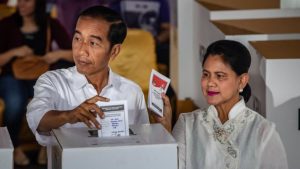Newspaper Article 14/05/2019

Indonesia went for local, provincial, legislative and presidential elections on 17 April 2019. 300,000 candidates contested for 20,528 seats across 34 provinces. Nearly, 193 million people casted their vote. It is for the first time that voting on such massive scale is being done. President Joko Widodo has a lead in the presidential run-up. As per the initial counting, Widodo has won 54 percent vote, while his political rival Prabowo Subianto from Great Indonesia Movement Party has secured 45 percent vote; the official results are likely by 22 May. The ‘Indonesian Democratic Party of Struggle’ has been in power since 2014. The government during their tenure primarily focused on economic empowerment. The local businesses were promoted, which significantly contributed towards improving the lives of Indonesians. Besides, the spending on education and health sectors was enhanced. These socio-economic indicators have greatly been a motivating factor for the public to vote again for the ‘Indonesian Democratic Party of Struggle.’
The agenda to empower the common man has won, and it has also strengthened the democratic forces in the country. President Widodo lead in the presidential race proves that merit oriented political culture can flourish if the ruling party takes into consideration the well-being of a common man. Mr. Widodo’s political career and journey to President’s office shows that having political background is not a prerequisite to enter politics, which, in actual is the essence of merit oriented political culture. Mr. Widodo does not come from a political or influential background; rather, his journey in politics is that of a struggle. In 2005, Mr. Widodo was elected as mayor of Solo (city of centre Java), later in 2012, he was Governor Jakarta. In 2014, he stood in the election for Presidential seat, aiming to counter corruption and address poverty and nepotism.
Looking at Indonesia’s economic growth, the government has focused on ‘hard’ and ‘soft’ approaches simultaneously. The spending on infrastructure alone cannot be termed as socio-economic development. The empowerment of masses through education is equally important. Thus, the Indonesian Democratic Party of Struggle policy had been to balance the soft and hard approaches, and employ both the variables for the betterment of people. With President Widodo second term in office, economic growth will surely be the focus. During the election campaign, President Widodo had pledged for infrastructural development, building of roads, railways, airports and dams. Besides, the plan to create 100 million jobs, and increased spending on education.
Indonesia is part of an economically well-integrated and dynamic region. The country has annual Gross Domestic Product (GDP) of US $ 1 trillion, and is likely to have GDP US $ 2 trillion in next five years and will stand in world top 10 economies by 2030. At the regional front, Indonesia’s relations with China are significant. China’s economic muscle coupled with the emerging power equation offers opportunities (and challenges) to the Southeast Asian states. China’s economic growth can be a destination for Indonesian exports (Indonesia exports to China US $ 3.26 billion and Indonesia imports from China US $ 7.2 billion). China under the Belt and Road Initiative (BRI) is likely to invest US $ 60 billion in Indonesia. There are some segments in Indonesian political elite which have been critical of Chinese projects in the country. Prabowo Subianto has criticized the Chinese investments in Indonesia. For instance, the “Bandung-Jakarta rail project” worth US $ 5.1 billion was to be completed in 2019 but the work has been delayed. Besides, the South China Sea and claim over the resource rich islands is likely to factor in the bilateral relations. Over Indonesia’s stance on South China Sea, the country has built a military base in Natuna Sea, which touches “China’s Nine-Dash Line” in the South China Sea. Indonesia may not be inclined towards China’s claim in South China Sea. Meanwhile, in view of China’s economic growth and China-Indonesia trading ties, the foreign investment from China is a good option, which will not only make it easier for Indonesia to develop infrastructure but will also open up economic incentives.
A version of article appeared in Daily Times dated 10 May 2019
[Disclaimer: The views expressed in the article do not necessarily reflect the institution’s view]


